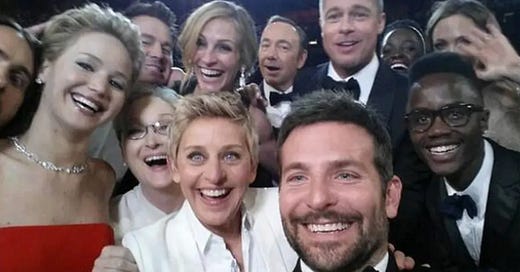What would Christ do?
What would Plato think?
What would Dickens make of this?
These are no longer “go to” questions.
Now we ask:
What would Cardi B do?
What would Jenny McCarthy think?
What would Pete Davidson make of this?
Or put it this way:
We used to consult our intellectual and spiritual exemplars.
Now we look to our celebrities.
IS THIS ENTIRELY A BAD THING?
Not always.
Most celebrities are smart. Smarter, certainly, than your average sociologist.
More important, they are keenly aware of what’s happening in our culture.
It’s wrong to think that they are merely famous for being famous. You are famous in our culture if and only if you resonate with our culture.
Being famous takes talent, cunning, all of that intelligence and all of that awareness.
Most famous people have earned their fame.
The question is whether they have earned our trust.
SO YOU’RE SAYING CELEBRITIES ARE A CULTURE PROBLEM?
Well, actually, I’m asking.
Are celebrities one of the reasons our culture is now so chaotic and unstable?
There is a strong case for “yes.”
For starters, celebrities have many flaws.
They can be self centered, as when Madonna was asked to celebrate Aretha Franklin. She referenced herself more than 50 times, and Ms. Franklin 4 times.
They can be naive, as when Gal Gadot lead a sing-along with fellow celebrities from the comfort and protection of their beautiful homes. She now agrees this was “in poor taste.”
Celebrities are not durable. That’s our fault. We raise them up and we strike them down. And because we have the attention span of a French monarch, their moment in the spot light is fleeting. But it means our relationship with them can be fleeting too.
Celebrities are vulnerable. Being a celebrity is incredibly perilous. Living in the very thin air up there, no mortal should wish for this. So celebrities suffer. They have break downs. They slide into drug dependency and bad relationships. At this point it is hard for them to be exemplars. Unless of course we are struggling too.
But here’s the key reason to treat celebrities as a culture problem.
In the course of the 20th century, celebrities ate their way through Western society, consuming or discrediting any and every elite that dared compete with them.
In this period, people still cared about scientists and other experts. They saw editors, publishers, judges, and professors as figures of authority. They admired and sought to emulate people of exalted social standing. They looked to religious leaders to address the big issues of the day. Artists, a few of them, were consulted. Designers, some of them, were gods.
This is mostly gone. Celebrities brought them low. It’s not clear that they meant to. It’s more likely that they simply won the popularity contest of contemporary culture.
We could choose between (nearly) dead white males, cranky, pipe smoking, vest wearing, utterly pompous creatures who would occasionally stoop to correct us. Or we could go with the effortlessly charismatic, blindingly beautiful, funny, endearing, eager-to-please people. I mean just look at the people in the “selfie” above. You can’t help but be wowed. Game, set and match to the movie star.
Celebrities remind me of the Rem Koolhaas library in Seattle.
This never fails to make me think of a mechanical monster that’s just crawled out of Seattle’s Elliot Bay and climbed the hill looking for lunch.
That’s what celebrities did. They came up out of the lagoon and helped themselves to all the culture they could find. They just ate everything.
It started with children’s books. They had to write em. Then it was lines of perfume and clothing. They had to design em. It was social causes (Diabetes! climate change! vaccination!). They felt we just had to hear from them. Then it was politics. Most of the people running for office in the US are strikingly attractive. Some of them could actually be part-time models. Increasing celebrities were prepared to opine on just about any topic, take on all the burdens of leadership. As if fame gave them wisdom.
But here’s the other reason that celebrity culture might be a cause of our instability. They colonized our young. There are lots of ways of making this argument, but I think “exhibit A” is probably TikTok. This platform matters because it mints celebrity. And that matters because a fifteen year old typically believes he or she matters in exact proportion to his or her fame.
Next time: 009 Culture solution: celebrities
◘◘◘◘◘◘◘◘◘◘◘◘◘◘◘◘◘◘◘◘◘◘◘◘◘◘◘◘◘◘◘◘◘◘◘◘◘◘◘◘◘◘◘◘◘◘◘◘◘◘◘◘◘◘◘◘◘◘◘◘◘◘◘
So far:
We now have five culture problems:
001 Culture Problem: the “Failure to Launch” people
002 Culture Problem: vibe shifts in decline
004 Culture Problem: decline of the water cooler
006 Culture Problem: bad food
008: Culture Problem: celebrities
We have a generation of young people waiting for adulthood to start.
We have evidence that the “center will not hold,” that our culture is no longer cohering.
We have evidence that something as fundamental as food was corrupted.
And today, we have an argument that says our chief influencers have a dubious influence.
We have three culture solutions:
003 Culture Solution: fluidity as an adaptation
005 Culture Solution: big pictures
007: Culture Solution: good food
The first says that we are cultivating new cultural properties, specifically a new fluidity that makes us more responsive when we are broadsided by disruption.
Second, it looks as if we are cultivating new intellectual gifts, the mastery of which will make us better at figuring out what our problems and solutions are.
Third, in the case of the artisanal revolution, we say an enormous revolution that took on what had happened to food, and reformed us massively. (For more on this.)
All three of these suggest that we have the ability to take on culture problems and they encourage the idea that we can do it.
By which I mean:
◘◘◘◘◘◘◘◘◘◘◘◘◘◘◘◘◘◘◘◘◘◘◘◘◘◘◘◘◘◘◘◘◘◘◘◘◘◘◘◘◘◘◘◘◘◘◘◘◘◘◘◘◘◘◘◘◘◘◘◘◘◘◘
So far:
001 Culture Problem: the “Failure to Launch” people
002 Culture Problem: vibe shifts in decline
003 Culture Solution: fluidity as an adaptation
004 Culture Problem: decline of the water cooler
005 Culture Solution: big pictures
006 Culture Problem: bad food
007: Culture Solution: good food
008: Culture Problem: celebrities
Next time:
009: Culture Solution: celebrities
And if you liked this post, please “like” it and retweet it.






Love this! Delicious, especially because I have no idea who Cardi B., Jenny McCarthy and Peter Davidson are. I'm not even going to look them up, because I'm just the old lady down the street. Celebrity has probably been A Thing since humankind began. I hear your question as, has it always been (as) Toxic, or (as) devoid of Meaning? We've all heard of Christ, Plato and Dickens. Even so, our best question now for all their fans might be, "Really?"
Love this! Delicious, especially because I have no idea who Cardi B., Jenny McCarthy and Peter Davidson are. I'm not even going to look them up, because I'm just the old lady down the street. Celebrity has probably been A Thing since humankind began. I hear your question as, has it always been (as) Toxic, or (as) devoid of Meaning? We've all heard of Christ, Plato and Dickens. Even so, our best question now for all their fans might be, "Really?"